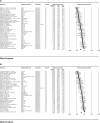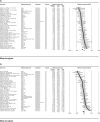Association between plant-based diets and plasma lipids: a systematic review and meta-analysis
- PMID: 28938794
- PMCID: PMC5914369
- DOI: 10.1093/nutrit/nux030
Association between plant-based diets and plasma lipids: a systematic review and meta-analysis
Abstract
Context: Although a recent meta-analysis of randomized controlled trials showed that adoption of a vegetarian diet reduces plasma lipids, the association between vegetarian diets and long-term effects on plasma lipids has not been subjected to meta-analysis.
Objective: The aim was to conduct a systematic review and meta-analysis of observational studies and clinical trials that have examined associations between plant-based diets and plasma lipids.
Data sources: MEDLINE, Web of Science, and the Cochrane Central Register of Controlled Trials were searched for articles published in English until June 2015.
Study selection: The literature was searched for controlled trials and observational studies that investigated the effects of at least 4 weeks of a vegetarian diet on plasma lipids.
Data extraction: Two reviewers independently extracted the study methodology and sample size, the baseline characteristics of the study population, and the concentrations and variance measures of plasma lipids. Mean differences in concentrations of plasma lipids between vegetarian and comparison diet groups were calculated. Data were pooled using a random-effects model.
Results: Of the 8385 studies identified, 30 observational studies and 19 clinical trials met the inclusion criteria (N = 1484; mean age, 48.6 years). Consumption of vegetarian diets was associated with lower mean concentrations of total cholesterol (-29.2 and -12.5 mg/dL, P < 0.001), low-density lipoprotein cholesterol (-22.9 and -12.2 mg/dL, P < 0.001), and high-density lipoprotein cholesterol (-3.6 and -3.4 mg/dL, P < 0.001), compared with consumption of omnivorous diets in observational studies and clinical trials, respectively. Triglyceride differences were -6.5 (P = 0.092) in observational studies and 5.8 mg/dL (P = 0.090) in intervention trials.
Conclusions: Plant-based diets are associated with decreased total cholesterol, low-density lipoprotein cholesterol, and high-density lipoprotein cholesterol, but not with decreased triglycerides.
Systematic review registration: PROSPERO number CRD42015023783. Available at: https://www.crd.york.ac.uk/PROSPERO/display_record.asp?ID=CRD42015023783.
Keywords: high-density lipoprotein cholesterol; low-density lipoprotein cholesterol; meta-analysis; plant-based diets; plasma lipids; systematic review; total cholesterol.
© The Author(s) 2017. Published by Oxford University Press on behalf of the International Life Sciences Institute.
Figures





Similar articles
-
The comparative efficacy of plant sterols and stanols on serum lipids: a systematic review and meta-analysis.J Am Diet Assoc. 2010 May;110(5):719-26. doi: 10.1016/j.jada.2010.02.011. J Am Diet Assoc. 2010. PMID: 20430133
-
Comparison of effects of long-term low-fat vs high-fat diets on blood lipid levels in overweight or obese patients: a systematic review and meta-analysis.J Acad Nutr Diet. 2013 Dec;113(12):1640-61. doi: 10.1016/j.jand.2013.07.010. Epub 2013 Oct 17. J Acad Nutr Diet. 2013. PMID: 24139973
-
Cinnamon use in type 2 diabetes: an updated systematic review and meta-analysis.Ann Fam Med. 2013 Sep-Oct;11(5):452-9. doi: 10.1370/afm.1517. Ann Fam Med. 2013. PMID: 24019277 Free PMC article.
-
A systematic review and meta-analysis of randomized controlled trials investigating the effects of curcumin on blood lipid levels.Clin Nutr. 2014 Jun;33(3):406-14. doi: 10.1016/j.clnu.2013.09.012. Epub 2013 Sep 25. Clin Nutr. 2014. PMID: 24139527
-
Lipid-modifying effects of krill oil in humans: systematic review and meta-analysis of randomized controlled trials.Nutr Rev. 2017 May 1;75(5):361-373. doi: 10.1093/nutrit/nuw063. Nutr Rev. 2017. PMID: 28371906
Cited by
-
Public Awareness of a Plant-Based Diet Following the Release of "Game Changers" and "What The Health" Documentaries.Am J Lifestyle Med. 2021 Sep 24;16(2):190-196. doi: 10.1177/15598276211044106. eCollection 2022 Mar-Apr. Am J Lifestyle Med. 2021. PMID: 35370517 Free PMC article.
-
Dietary Models and Cardiovascular Risk Prevention in Pediatric Patients.Nutrients. 2023 Aug 21;15(16):3664. doi: 10.3390/nu15163664. Nutrients. 2023. PMID: 37630854 Free PMC article. Review.
-
Association between Unhealthful Plant-Based Diets and Possible Risk of Dyslipidemia.Nutrients. 2021 Nov 30;13(12):4334. doi: 10.3390/nu13124334. Nutrients. 2021. PMID: 34959886 Free PMC article.
-
Combined effects of genetic background and diet on mouse metabolism and gene expression.iScience. 2024 Nov 4;27(12):111323. doi: 10.1016/j.isci.2024.111323. eCollection 2024 Dec 20. iScience. 2024. PMID: 39640571 Free PMC article.
-
The Effect of an 8-Week Vegan Diet on the Nutritional Status and Performance of Semi-Professional Soccer Players-Results of the VegInSoc Study.Nutrients. 2025 Jul 17;17(14):2351. doi: 10.3390/nu17142351. Nutrients. 2025. PMID: 40732976 Free PMC article.
References
-
- Kuklina EV, Yoon PW, Keenan NL. Trends in high levels of low-density lipoprotein cholesterol in the United States, 1999–2006. JAMA. 2009;302:2104–2110. - PubMed
-
- Farley TA, Dalal MA, Mostashari F et al. . Deaths preventable in the U.S. by improvements in use of clinical preventive services. Am J Prev Med. 2010;38:600–609. - PubMed
-
- Pletcher MJ, Lazar L, Bibbins-Domingo K et al. . Comparing impact and cost-effectiveness of primary prevention strategies for lipid-lowering. Ann Intern Med. 2009;150:243–254. - PubMed
-
- Lemieux I, Lamarche B, Couillard C et al. . Total cholesterol/HDL cholesterol ratio vs LDL cholesterol/HDL cholesterol ratio as indices of ischemic heart disease risk in men: the Quebec Cardiovascular Study. Arch Intern Med. 2001;161:2685–2692. - PubMed
-
- Stone NJ, Robinson JG, Lichtenstein AH et al. . 2013 ACC/AHA guideline on the treatment of blood cholesterol to reduce atherosclerotic cardiovascular risk in adults: a report of the American College of Cardiology/American Heart Association Task Force on Practice Guidelines. J Am Coll Cardiol. 2014;63(25 pt B):2889–2934. - PubMed
Publication types
MeSH terms
Substances
LinkOut - more resources
Full Text Sources
Other Literature Sources
Medical
Miscellaneous

